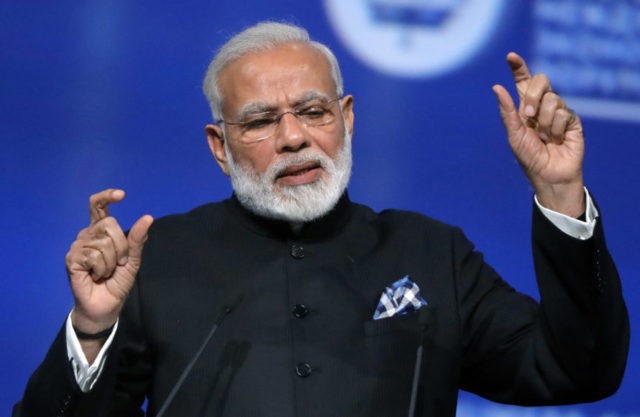WASHINGTON (AP) — President Donald Trump meets for the first time Monday with India’s Prime Minister Narendra Modi, and personal chemistry as much as policy could determine the direction of future relations.
The leaders of the world’s two largest democracies will convene at the White House. They will look to expand ties on defense and fighting terrorism, but strains are likely on trade.
Trump has so far focused on outreach to China, India’s strategic rival, as he looks to Beijing to rein in nuclear-armed North Korea. But Washington and New Delhi share concerns about China’s rise as a military power that has underpinned increasingly close relations in the past decade.
The Trump administration says it wants to provide India the kind of defense technology it does to the closest U.S. allies. In a concrete indication of that, the U.S. is set to offer a $2 billion sale of U.S.-made unarmed drones to help in surveillance of the Indian Ocean.
And in a move signaling a tougher stance by the Trump administration against Pakistan-based militants, the State Department imposed sanctions Monday on Syed Salahuddin, leader of the main rebel group that fights against Indian control in the divided Himalayan region of Kashmir.
Although Modi’s two-day Washington visit, which began Sunday, is lower key than his previous three trips to the U.S. since he took office in 2014, there will be plenty opportunity for face time with Trump.
After their talks, Modi and Trump will make statements in the Rose Garden. Modi will also have dinner with the president and first lady — the first dinner Trump has hosted for a foreign dignitary at the White House, although he has hosted the leaders of Japan and China at his resort in Florida.
Before going to the White House, Modi met separately with Secretary of State Rex Tillerson and Defense Secretary Jim Mattis.
Trump and Modi share a populist streak and a knack for social media, but their economic nationalist agendas could clash. While Trump champions the idea of “America First” and wants to stop the migration of jobs overseas, Modi has his own drive to boost manufacturing at home, dubbed “Make in India.”
India is among the nations singled out by the Trump administration for their trade surpluses with the U.S., and it is also reviewing a visa program used heavily by skilled Indian workers.
Both sides want better market access. U.S. is seeking stronger Indian protection of intellectual property rights, reductions in tariffs and narrowing of the $30 billion trade deficit. India has its own concerns, including over regulatory barriers faced by its producers of generic medicinal drugs.
Michael Kugelman, a South Asia expert at the Wilson Center, predicted that Wednesday’s summit would be a “no-frills, let’s get acquainted affair” whose outcomes, from their body language to the post-meeting joint statement, will offer clues about the future of U.S.-India relations.
“For Trump, the personal is political,” said Atman Trivedi, an Asia specialist at Hills & Company consultancy.
Ashok Sajjanhar, a former Indian diplomat, said that India is hopeful but apprehensive. “Modi’s effort during the visit would be to get Trump strategically engaged with India — to get him to see the India-U.S. partnership as a win-win for both countries,” Sajjanhar said.
On fighting terrorism, Kugelman said the two leaders have a similar worldview — that “it needs to be destroyed wherever it rears its murderous head.”
Modi will be hoping that as well as tackling the Islamic State, Trump will step up pressure on militant groups based in Pakistan accused of launching attacks on India. He’ll also want to learn about the administration strategy to stabilize Afghanistan, where India has committed $3 billion in aid since 2001.
Climate change could be a contentious issue. New Delhi was irked by Trump’s decision to pull out of the Paris accord, and his claim that India had made its participation contingent on receiving billions in foreign aid. India denies that and says it will continue to be part of the accord, regardless of U.S. participation.
___
Associated Press writer Nirmala George in New Delhi contributed to this report.

COMMENTS
Please let us know if you're having issues with commenting.